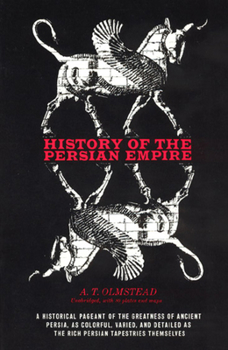History of the Persian Empire
Select Format
Select Condition 
Book Overview
Out of a lifetime of study of the ancient Near East, Professor Olmstead has gathered previously unknown material into the story of the life, times, and thought of the Persians, told for the first time from the Persian rather than the traditional Greek point of view. "The fullest and most reliable presentation of the history of the Persian Empire in existence."--M. Rostovtzeff
Format:Paperback
Language:English
ISBN:0226627772
ISBN13:9780226627779
Release Date:February 1959
Publisher:University of Chicago Press
Length:670 Pages
Weight:1.40 lbs.
Dimensions:1.5" x 5.4" x 7.9"
Customer Reviews
5 ratings
Impressive. Worth the Time to Read.
Published by Thriftbooks.com User , 17 years ago
This book is utterly remarkable. Well written and incredibly comprehensive iteration of the scope, flow and detail of the empire that was Persia, from early pre-Empire times to the Alexandrian conquest (and a bit beyond). It discusses legal, social, military, architectural, religious and business practices, inter-familial rivalries, conquests,etc., in remarkable detail, and it even puts Biblical history of the Jews in exile in context. It captures aspects of the ruling style and methods of the Mede and Persian rulers. It is simply a great and literally huge book, by a Professor whose depth of knowledge and love of his subject is inspiring, even several decades after his death.
Old But Still Kicking
Published by Thriftbooks.com User , 21 years ago
While I'm sure that the information in "The History of the Persian Empire" must have been superceded to a degree in the 50 years since it has been published, and it is likely that Olmstead may have been overly sure of facts, this book is a pleasure to read and a mine of cultural food for thought. I fear the reviewer above who managed to finish the book knowing next to nothing about ancient Persia is saying more about herself than this book. I was chiefly interested in the religious and cultural aspects of the Persian period, rather than the military and political ones, and I have come away from this book considerably more enlightened than I was by Edwin Yamauchi's treatment of Persia. Olmstead is both a vivid and readable writer, witty, detailed and fair-minded. His treatment of the Zoroastrian religion was eye-opening for me, and the way he deals with Palestine and Egypt was also illuminating. I especially got a kick out of his paraphrase renditions of some ancient documents and inscriptions at a purely aesthetic, and somewhat humorous, level. I'm sure there's still more to know, but this is a terrific overview.
The World Behind the Veil
Published by Thriftbooks.com User , 22 years ago
Olmstead's classic History of the Persian Empire serves as counterpoint to the chauvinisism we have inherited from the Greek sources like Herodotus and Thucydides who drew an imaginary line in the sand between the "western" civilizations of the Meditteranean and the "oriental "barbarism" of Asia Minor and Persia. As Olmstead shows, the Persian Empire's influence on Western civilization is lingering and profound. Its cult of Zoroastra, with its emphasis on inner virtue and neighbourly love, had a dramatic influence on early Christians. It was Persian armies who liberated the Israelite exiles from the "rivers of Babylon" and permitted a religious renewal in Jerusalem. It was under the Achaemenid kings that the great astronomers, philosophers and mathematicians of the era thrived; indeed it was only because Herodotus, as an Ionian Greek, had Persian citizenship that he was able to travel to Egypt. As Olmstead explains, the great Battle of Marathon was a mere flea-bite for an empire that stretched from India to Egypt. Even in decline, this land was far more than a convenient piece of real estate for Alexander to conquer, and its rulers far more sophisticated than the simple tyrants portrayed by Herodotus and Calisthenese, and it has much to teach us.
A Valuable Adjunct to Ancient Greek History
Published by Thriftbooks.com User , 22 years ago
It is, of course, impossible to cram this much history into a single small volume and still keep it perfectly accessible to the beginning history reader, but this author makes a very creditable effort in that direction. The book is dense, chronologically, and must be supplemented with other sources for a comprehensive view of its subject material.That said, the value for this reviewer was in the fresh viewpoint on events usually told from the Greek perspective, and provides a welcome supplement to ancient sources (Thucydides, Xenophon) and modern ones (Donald Kagan's astonishing four-book series) concerning the Peloponnesian War and the years surrounding it. One is sometimes left wondering, with all that Greek victory, how the Persians ended up in control of Ionia, and how the Greek colonies there ended up paying tribute to the Great King after all. This volume fills in much of the missing information - notably, that the Greeks were all too often venal, treacherous, and easily bought off by Persian gold and outmaneuvered by Persian diplomacy. How that was done is a little-told story, and is admirably related here.The author's prose in this section is some of the best in the book - dry, witty, and unapologetic. Students of 5th- and 4th-century Mediterranean history will be well-served by tucking this little volume into their collections.
An excellent scholarly book on Persian Empire
Published by Thriftbooks.com User , 24 years ago
First things frist. The author's first name is Albert not Arthur. This is a great book if you are serious history reader or interested in Iran. It treats the origins of the Persian (Iranian) Empire founded by Cyrus the Great. Although published some five decades ago, it has much to offer.




